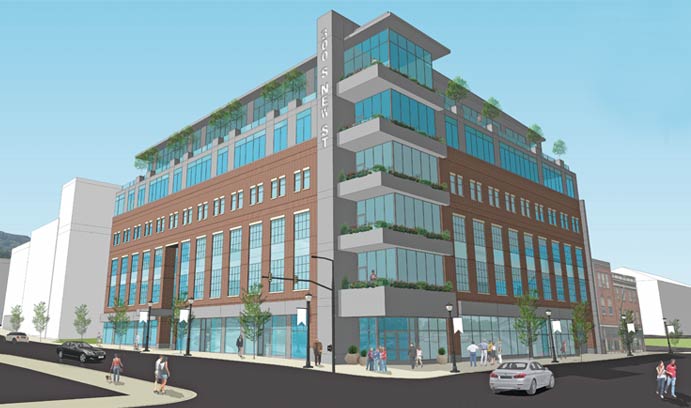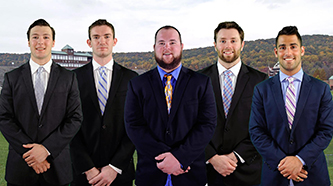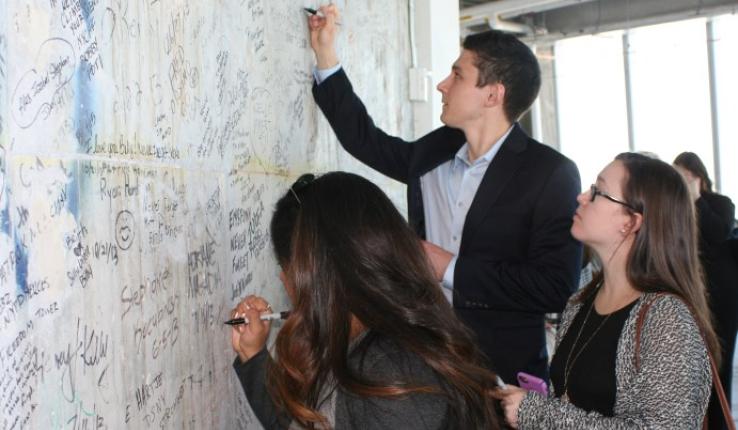Collins Family Real Estate Competition focuses on South Side projects

Six teams in the 2016 Collins Family Real Estate Scholarship Competition examined a portfolio that included a retail/office building at Third and New Streets that is now under construction; Lehigh has already signed on as a tenant.
How feasible are proposals to build a six-story retail/office building, a student housing tower and seven-story apartment complex on Bethlehem’s South Side, near the Lehigh campus? What about additional proposals for two more apartment houses and an office building—all with retail on the first floor?
Six teams of Lehigh students analyzed the projects for a year as part of the 2016 Collins Family Real Estate Scholarship Competition, a hallmark of Lehigh’s real estate practicum/integrated real estate program (ire@l).
“It was definitely challenging at times, especially working with ongoing projects, because information kept changing,” said Austin Devine ’16, who, along with team members Steve Camasta ’16, Matthew Laub ’16, Gregory Palma ’16 and Stefan Sansone, won the competition as AFGM Realty Inc.
In the end, the winning team offered this assessment of the projects: Though laudable, they’re risky.
“We did have our reservations,” said Devine, though he added, “If all of [the projects] were to come together and work out, they would help the South Side.”
The six teams in the competition all examined the same portfolios, which was a departure from previous contests. One development portfolio included a retail/office building at Third and New Streets that is now under construction; Lehigh has already signed on as a tenant. Developer Dennis Benner ’76 and his sons, Brandon ’07 and Garrett ’04, who both had competed in the Collins competition while Lehigh students, also proposed a 348-bed student tower and an apartment complex at Fourth Street.
The teams also examined a portfolio from Peron Development, which consisted of an office building and two apartment houses to be constructed on Third Street, between Filmore and Buchanan streets.
Laub said the potential impact of the projects was not lost on the teams.
“The South Side is long overdue for new developments that will bring life and rejuvenation along with them,” he said. “There is no perfect way to do this, but the developments we analyzed are an amazing start. They just need to be done in the best way possible.”
In fall 2015, the teams spent the semester studying the physical characteristics of the properties as they related to value: property history, architecture, tenant mix, neighborhood environment, and other considerations. They worked in commercial real estate software—ARGUS, Co-Star and Loopnet—and submitted a report with a market analysis and property description.
Then in spring 2016, the teams performed the data collection and analysis needed to complete a full estimate of the market value of the properties, utilizing income, cost and sales comparison approaches that they learned in their classes. They also worked with ARGUS valuation software used in the commercial real estate industry.
The program culminated in the bracket-style competition, in which the teams presented their detailed analyses of the projects to a panel of academic, and practitioner judges many of whom are Lehigh alumni. The teams had practiced for weeks, including with Stephen F. Thode, director of ire@l program at Lehigh, practitioner mentors and appraisers.
“Since the founding of the Goodman Center, our goal has been to bridge the gap between real estate education and the real world of real estate,” said Thode. “The practicum and Collins Family Scholarship Competition provide our students with a hands-on learning experience unlike that at any other university. The AFGM team consistently demonstrated a love of learning, critical thinking, discipline and superb teamwork—qualities that will serve them well in their careers.”
The ire@l program at Lehigh is part of the Goodman Center for Real Estate Studies, which offers a real estate minor that is open to all students in any major as well as a track in finance for finance majors. Students complete the real estate practicum courses and the Collins competition, which is part of a generous endowment from Webster A. Collins ’57 and his son, Harris ’91.
For the competition, members of the winning AFGM Realty team—who also were teammates on Lehigh's football team, where they were starters or key contributors—divided tasks. Some concentrated on the financial details and others focused on market research.
“When we did our financials, we thought the developers should consider whether they should do all of this,” Camasta said. And they had recommendations: a 24-hour diner, a pharmacy, high credit-rated office tenants and lower rents for student housing.
Laub said the team, in its presentation, wanted to convey the amount of risk it saw in the proposals. A key concern, he said, was that none of the properties at the time had any retail tenants lined up, which could pose problems under Bethlehem’s City Revitalization and Improvement Zone (CRIZ) program for developers seeking financing.
Overall, team members said they valued the experience of the Real Estate Practicum, which is the capstone course of the ire@l program, and the Collins competition, including the opportunity to be able to meet with Lehigh alumni in the real estate industry.
“It was really interesting to see how far you had come from the start of the year to the end of the year,” said Camasta. “And it was real-life practice.”
Laub said the experience, including working with very knowledgeable professors, gives students “a leg up on the competition, when it comes to applying for jobs and being in an interview process.”
Posted on:




